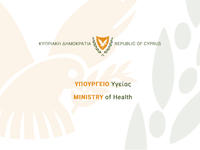Press Releases

26-09-2019 20:48
Speech of the Minister of Health, Mr Constantinos Ioannou, at the 3rd Cyprus HealthCare Conference Gala
Health is well recognized as a crucial factor for sustainable human development, both from the perspective of human rights, as well as an essential contributor to the economic growth of the society. It contributes to productive employment, reduces expenditure on illness care and assures greater social cohesion leading to national development. I would like to take the opportunity to briefly outline to you my Vision and subsequently the Ministry’s Vision for 2023 and the steps been undertaken by this Administration towards achieving out set targets.
What do we want to achieve by 2023?
1) First and foremost, successful implementation of Gesy with all its benefits;
2) Unification of the public and private sectors;
3) Digitalisation of health;
4) Improved overall quality of health services provided; and
5) Emphasis on Prevention through Public Health Policies and the new role of the Ministry of Health.
General Health System
Until the end of May, Cyprus was the only European Union state in which there was no universal health system with coverage for the whole population. The previous health system of our country consisted of two parallel service sectors, public and private, of similar size, with few links and interactions between them. The public sector was financed exclusively by the state budget, while the private sector was largely financed by the family budget.
Now, Cyprus is in the process of implementing the General Health System (GHS), which is the biggest endeavours being undertaken so far by the Ministry of Health. The General Health System promotes universal healthcare coverage, in line with the World Health Organisation Policy, addressing the existing inequalities of healthcare coverage amongst the population. It is based on the principles of universal coverage, equity in the provision of healthcare services on the basis of need rather than the ability to pay, solidarity and high-quality of services.
The first phase of GHS was implemented on the 1st June 2019 and includes the outpatient healthcare: Family Doctors, Specialists for outpatient care, Pharmaceuticals and Labs for outpatient care, with the full GHS implementation taking place on the 1st June 2020. The phased implementation of the GHS allows for better monitoring of the implementation of the system by the Government, the containment of the total cost of health expenditure and the smooth adjustment of the stakeholders involved, especially the employers and the employees, who bear part of the cost of the system. It also helps in the timely handling of any problems that may arise during the implementation of the project.
The process of moving to the new system back in June 2019 was fairly smooth and all technical and procedural problems are addressed by the HIO immediately. To identify and solve potential problems we have formed back in May 2019 working groups with representatives from all stakeholders and HIO that meet on a regular basis. During these meetings problems are identified along with possible solutions and agreed timeframes. As a result, HIO has so far proceeded with a number of adjustments especially with regards to the software and there is an agreed time frame for programmed changes in the next three months.
The main Challenges we face at present are summarized as follows:
- Health providers still need support to use the information and technology system tool and the system itself undergoes continuous alterations to become more user friendly and fulfil the expectations of the providers. As I have already mentioned, further upgrades of the system are planned for the next three months based on feedback from health providers.
- At the same time, beneficiaries need continuous guidance to navigate correctly through the system. They also need to familiarize and adjust to the concept of personal doctor and what this entails.
- Unifying public and private outpatient provision of drugs created transient problems of entry and adequate circulation of drugs to the pharmacies. Forecasting on behalf of pharmaceuticals was not an easy task as we entered a completely new environment with unpredictable demand generators, but as the weeks pass by and more demand data are available adjustments are made and we expect that in the next few weeks the situation will be normalized. To ensure a smooth transition, we have formed a steering committee in March 2019 with representatives from the Pharmaceutical and Purchasing Departments at the Ministry, the HIO, private pharmaceutical warehouses and pharmaceutical companies that meet on a regular basis.
- From the System point of view, the use of protocols and regulations needs to be intensified in order to secure fiscal responsibility. We place great emphasis on fiscal responsibility as this will be the cornerstone of the success of the system. As of last week, a number of protocols have been implemented with regards to drugs and there is a plan for the gradual implementation of protocols and regulation in the coming weeks that will ensure proper usage of the system by all those involved. Overall more than 6.500 rules and regulations will be implemented within the system in the next three months.
- Verification of claims – All claims are verified by a team subcontracted to NCR and at the same time, the in-house claims department of HIO verifies claims randomly on a sample basis. The fact that all medical acts are now electronically recorded enables HIO to generate statistical reports such as average number of referrals for MRI per doctor or average number of referrals to specialist and a number of other reports -actually the list is endless- and provide the necessary data to HIO to identify outliers and potentially deviant behavior.
- Enrollment of doctors of specific specialties was a major challenge back in June, but the number of doctors enrolling has increased dramatically in the last few weeks and we experience a steady flow of new enrollments. As of today, 1.485 (548 GPs and 932 Specialists – 25/9) doctors have registered compared to 516 (463 GPs and 53 Specialists) back in June.
- Discussions between HIO and the providers for the integration of private hospitals into GHS are currently taking place.
Autonomisation/Reform of Public Hospitals
To address all major issues and inefficiencies of the previous system, a morecomprehensive package of reforms of the healthcare sector are being undertaken besides the implementation of the GHS. A major component of the new reforms is the autonomisation and reform of public hospitals and the modernisation of Primary Healthcare. This, not only entails investment in infrastructure, human capital, health technology and information and technology systems, but also requires better management practices and accountability. The new Organisation State Health Services Organization (OKYpY) has been set as planned, the Board of Directors of the Organisation is in place since December 2017 and the central level management teams, as well as the directorates’ management teams, are in place since December 2018. All hospitals’ and Primary Health Care Centres’ personnel was seconded / transferred to the new organisation in January 2019.
The health facilities of OKYpY are now operating under a different framework of management. This being more flexible and faster, free of any bureaucratic procedures that characterise the public sector. Personnel knowledgeable in hospital administration is going to provide the Organisation with better planning skills and more efficient ways of managing resources, reducing administrative costs and grabbing opportunities to create economies of scale.
The current challenges of the Organisation are those of:
- the recruitment of adequate administrative staff, accountants and IT personnel;
- retaining and recruiting new medical doctors;
- introducing Information and Technology financial tools as well as tools to monitor productivity;
- facing simultaneously hospital as well as health system reforms challenges;
- lack of internal as well as external communication strategy; and
- an enormous resistance to change. This is actually the biggest challenge for OKYpY.
I am confident that for the years to come OKYpY will pursue its vision for better health for the Cypriots, through its operation as an administratively efficient, technically excellent, innovative, flexible and inspirational Organisation. Similarly confident that in three years’ time citizens will enjoy high quality health services, away of possible hardships, in an economically viable health system.
Reform of the Healthcare Sector
Apart from the autonomisation of public hospitals and the implementation of Gesy, the comprehensive reforms package includes amongst others the following:
- The introduction of e-health. An Integrated Health Information System will be rolled out to all public hospitals and health centers within the next four years. At the same time, a draft new legislation on e-health, which allows the introduction of the medical file for each resident of the Republic in an electronic form, has recently been approved by the level of the Parliament. This pillar of the reform is considered very important as it will create transparency and will help to control and reduce cost of the health services provided. The formation of the Integrated Electronic Health record will help monitor clinical activities, enhance efficiency and reduce cost. Furthermore, the absence of an electronic patient file means that at present, we cannot exploit cross-border access capabilities. The implementation of e-health, apart from unifying private and public healthcare practices at national level, will also unify healthcare practices at European and cross-border level. Finally, the national repository of electronic health records will enable the creation of anonymized databases for healthcare planning, prevention, research and development of smart application for the citizen and the healthcare professionals. It is estimated that the first phase of the project will be ready for use by the end of 2020;
- The establishment of University Clinics, and the collaboration of academics and health professionals, to improve the provided services, invest in human resources and obtain EU funding to develop the sector of medical research. Legislation is ready and will be submitted to Parliament by the end of October for ratification. The establishment of University Clinics, which as long due, will, inter alia, improve the quality of care and develop new cures and treatment therapies through innovative diagnostic and treatment technologies, attract various sources of funding for research purpose, promote medical tourism, and provide the appropriate scientific training for new doctors and scientists;
- The establishment of an autonomous National Pharmaceutical Authority that is going to bring countless benefits for involved stakeholders, like cost-efficient operation, improved turnaround times and elimination of bureaucratic red-tape in key procedures for the regulation of medicines for human use, medical devices, cosmetics and food supplements.
- The restructuring of the Ministry of Health. Following the creation of the OKYpY, the Ministry of Health and its Departments will no longer serve the role of a healthcare provider and will concentrate towards policy formulation, strategies and its regulatory functions.
Public Health Policies / Strategic Planning
Policy formulation and strategies should and will be the cornerstone of all activities of the Ministry of Health. As a society, we face a number of challenges that already affect Public Health, will place considerable strain on our human and financial resources and most important will affect our Health and quality of life and we need to monitor and evaluate them on a constant basis and come up with policies and strategies that will tackle them. Specifically:
1. Ageing of the Cypriot population presents considerable challenges to the health system and the role of life course approach to healthy ageing is important.
2. Determinants of health problems such as poor and unhealthy diet, lack of physical activity, tobacco smoking, drug abuse and excessive alcohol consumption contribute significantly to most chronic diseases, such as diabetes, heart diseases and many types of cancer.
3. Improvements in life expectancy gained in recent decades are threatened by the rising rates of obesity.
4. Lower socio-economic status and financial constrains jeopardize health and well-being of groups of the population.
5. There is an emergence of new diseases such as WestNile Virus, SARS, MERS and drug resistant illnesses (such as MRSA) and re-emergence of diseases such as tuberculosis, that demonstrate the health protection challenges in a globalised world.
Public health provision is going to be upgraded with the presence of the Personal Doctor (PD) as a main stakeholder for the provision of healthcare to all beneficiaries. His role is not only the one of a gate-keeper to the rest of the system, but also the health professional, who is going to implement public health initiatives at the level of the individual. Screening programs remain as a responsibility of the Ministry of Health, but the role of the PD in achieving high level of coverage is crucial.
Cancer Screening Programs
Besides the screening program for breast cancer, screening for colorectal cancer is going to expand nationwide and cervical cancer screening program is going to be introduced as a third adult program. Similarly, a screening program for children for autism is in the process to be introduced. The Health Insurance Organisation information technology tool is going to be an invaluable assistant in monitoring the process.
National Strategy on Cancer
Addressing the issues of cancer patients and improving the overall care of cancer patients has been set as one of our top priorities. As a result we have proceeded with the update of the National Strategy on Cancer based on the EU guidelines and new developments in cancer that cover the following areas:
- Prevention;
- Early diagnosis/treatment;
- Psychosocial support-rehabilitation-palliative care;
- Recording of incidents – cancer registry; and
- Research.
The main pillars of this strategy relate to the development of:
(a) The National Cancer Institute: This Institute will have the responsibility to proceed with the evaluation, accreditation and organisation of all oncology services, including the cancer registry. At the same time, it will be responsible for defining the national guidelines and protocols for the treatment of cancer. Our goal is to set up the Institute within the next two years.
(b) The unification of the existing oncology departments: Nicosia General Hospital, Limassol General Hospital together with the Bank of Cyprus Oncology Centre will operate under one administrative structure. Currently, we are reviewing the process and our goal is to be implemented within the first three months of 2020.
(c) Assist and reinforce the efforts by private organisations and non-profit ones. To this end we have already signed an agreement for oncology services with the German Oncology Center, continue to provide considerable financial assistance to Bank of Cyprus Oncology Center and other non-profit organisations such as Anti-cancer Society.
The above will assist in the proper utilization of all the offered oncology services in our country, while ensuring safety for the patient. The accreditation, the application of unified protocols and the interdisciplinary approach guarantees a high-quality oncology service.
Other Strategies / Policies
Besides the National Strategy on Cancer, a great number of strategies on health determinants and non-communicable disease are either in place or to be developed and implemented. Examples are the strategies on diabetes, substance abuse, smoking, promotion of breast feeding, healthy nutrition, and reducing the number of caesarean sections. Part of strategy for 2023 is to provide financial assistance for the upgrading of facilities and health services to specific patients’ groups, such as Rheumatisms, Rare Diseases and Thalassaemia.We are at the final stages of announcing our cooperation with the Association of Rare Diseases for the creation of a Help Center for rare diseases that will provide information and support to both patients and doctors for rare diseases and will act as a hub center between patients and health care providers.
Furthermore I am pleased to announce that we are at the final stages of submitting to the Council of Ministers for approval the financial aid for the construction of the new Thalassaemia Center at the same grounds where the existing one is, at a total cost of 1.5 million euros and upgrade the existing premises for the much needed expansion of Makarios Hospital.
Unit of Surveillance and Control of Communicable Diseases
The emergence of new and reemergence of old communicable diseases demonstrate the need to expand the Unit for Surveillance and Control of Communicable Diseases and further upgrade our national response to communicable diseases. A National Strategy to combat Tuberculosis is in place, as well as one to eradicate Hepatitis C and one to tackle HIV/AIDS, an action plan for Ebola, as well as for influenza. Good data collection, both laboratory and epidemiological, are necessary to guide actions as well as to monitor progress.
Ladies and gentlemen,
We live in interesting and challenging times. I am excited about the future of Cyprus Health System and Health in the 21st century. I am convinced about the importance of structured public health initiatives, in which everyone will be encouraged to play a part in protecting and improving the population’s health, away from public health threats, living in a healthier and more sustainable environment, with increased social and economic productivity and greater social inclusion. Our vision is also of firmly anchoring Cyprus into a 21st century healthcare system centered on the patient.
Before closing my speech, let me remind you of the saying by Mahatma Gandhi that “it is health that is real wealth and not pieces of gold and silver”.
Thank you very much for your attention.
(MKY)
Relevant Press Releases







